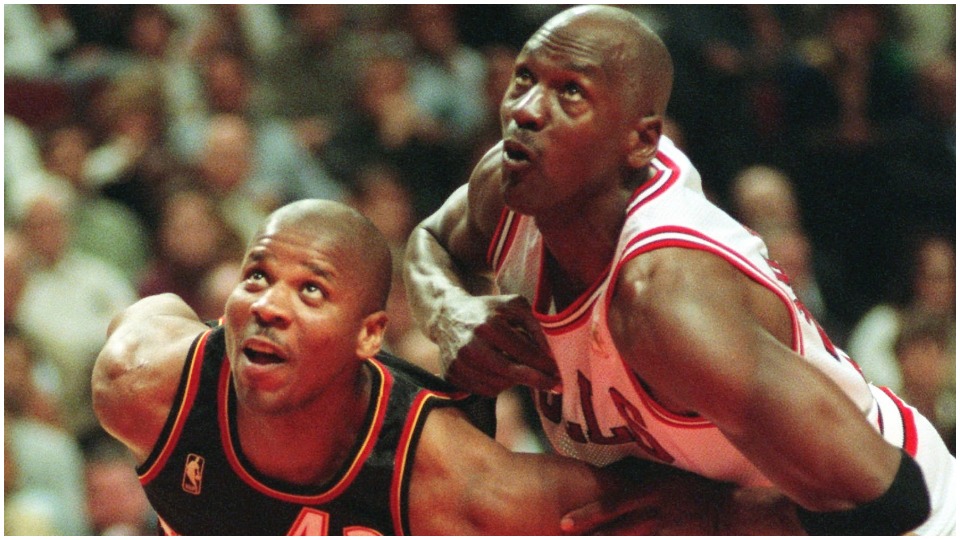
As we sit in quarantine and practice physical distancing, with too little money and too much time on our hands, a masked nation turns its lonely eyes to . . . Michael Jordan.
The ESPN and Netflix miniseries Last Dance offers this sports-crazed nation pandemic diversion with its memorialization of the Chicago Bulls’ 1997-98 pursuit of its sixth National Basketball Association title. With no other major sports viewing, we are presented with a gem.
Michael Jordan offers us hope in a time when heroism is in short stock. No athlete in the American sports pantheon has shone as brightly. Jordan’s basketball feats have established him as consensus GOAT—Greatest Of All Time. He won six NBA titles, five Most Valuable Player Awards, ten Scoring Titles, and 14 NBA All-Star Game Selection. He holds the NBA records for highest career regular season scoring average. In 1999 he was named Greatest North American Athlete of the 20th century by ESPN.
Jordan’s Chicago team of 1996-97, with a 72 win-10 loss record, had been generally regarded as the NBA’s finest until surpassed by the record-breaking 2015-16 Steph Curry-led, 73-9 Golden State Warriors team.
But the fiercely competitive nature which propelled Jordan’s astonishing skill set to dominate basketball as no other professional star had dominated their sport, did not make for a smooth ride.
Jordan, who had editorial power over this TV series’ final product, lets us see the less exemplary side. His quest for perfection is relentlessly costly. He mercilessly taunts and goads his teammates. He carries on his feud with Isaiah Thomas 30 years later! Was it necessary to punch then mate, now Warrior Coach Steve Kerr in the face? Sure, he apologized later and passed the ball to Kerr, who sank the championship-winning shot. Did his quest for perfection really demand so much collateral damage?
And where was he when basketball, the most progressive of our major sports, stood up time and again to fight racism, war, and injustice? When Three Point Contest winner Craig Hodges questioned Jordan’s silence on social issues, didn’t Jordan push him off the team? Wasn’t it quiet Mike who when confronted on being AWOL from social issues famously opined: “Republicans buy sneakers, too!”
Last Dance shows only glimpses of how this mix of athletic brilliance and political blight evolved, how Jordan was shaped into a brand and marketed. It does not contract to do that, no matter how much we might hope for a more complete picture of the man who now is the billionaire owner of his own NBA team, the Charlotte Hornets.
We do get more revealing complete sketches of other Bulls teammates. The rise of All Star Scottie Pippen was particularly poignant, his invaluable play exploited as he is harnessed to a low-paying contract. Dennis Rodman burns a bright arc as he flares across the screen snatching rebounds, bedding Madonna and wearing a bridal gown as he weds himself. The Zen Master Coach Phil Jackson battles acerbic, penny-pinching General Manager Jerry Krause. Teammates Horace Grant and Steve Kerr offer limited commentary. Owner Jerry Reinsdorf has strangely little affect for the person probably most responsible for breaking up the Bulls. Had he stepped in to insist that Phil Jackson be retained as coach, then Jordan would have stayed, presumably extending the dynasty.
Without too much handwringing over what could have been, Last Dance is still riveting. The woven tapestry of athletics informed by the very human emotions of the weavers stands as compelling entertainment.
We can only hope for as good a product in some future time when we are able to view film of the more engaged social activists who built the league and sustained its progressive traditions.
Now that we have unlocked a bit of the formula, let’s have a biography of the pillar upon which basketball was built: Bill Russell, who won 11 NBA titles in 13 years for the Boston Celtics while courageously fighting for social justice and against war and racism. We need to see LeBron James, who is still rising to challenge Jordan’s records while speaking out on progressive issues and supporting a variety of educational and philanthropic causes. It would certainly be valuable to celebrate the courage and creativity of coaches Dean Smith and Red Auerbach.
So let us give Jordan some company and leadership—and learn as well as entertain our way out of this pandemic!












Comments